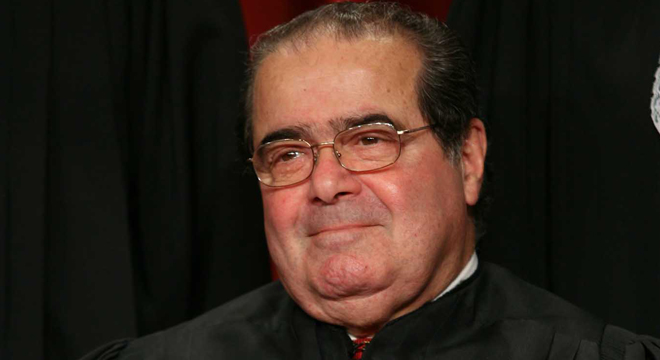To observers of the ‘Obamacare’ oral arguments, it would come as no surprise that Justice Antonin Scalia is a likely vote to strike it down. But there has remained one major wrinkle in his prior jurisprudence that continues to give hope to a handful of the health care law’s proponents that he’ll vote to uphold it.
Now, within days of the historic ruling, Scalia is releasing a new book in which he finds fault with a Roosevelt-era Supreme Court decision that forms a critical part of the legal undergirding for the health care reform law. For Scalia, that’s a dramatic turnaround, because he has previously embraced the premise of that decision in an opinion he authored in 2005 that supporters of the Affordable Care Act have frequently cited.
In Scalia’s new book, a 500-page disquisition on statutory construction being published this week, he says the landmark 1942 ruling Wickard v. Filburn — which has served as the lynchpin of the federal government’s broad authority to regulate interstate economic activities under the Constitution’s Commerce Clause — was wrongly decided.
According to an advance review in the New York Times, Scalia writes that Wickard “expanded the Commerce Clause beyond all reason” by deciding that “a farmer’s cultivation of wheat for his own consumption affected interstate commerce and thus could be regulated under the Commerce Clause.”
Scalia himself relied on Wickard in his 2005 opinion in Gonzales v. Raich, concurring with a 6-3 majority that said Congress may, under the Commerce Clause, prohibit a licensed medical marijuana patient from growing pot for personal consumption even if it’s legal in the state. A central foundation for that sweeping federal power, the court declared, was Wickard.
At the time, Scalia emphatically agreed, writing in his concurring opinion that “where Congress has authority to enact a regulation of interstate commerce, it possesses every power needed to make that regulation effective.” The Reagan-appointed justice’s decision upset libertarians who saw Raich as a squandered opportunity to limit the 70-year trend of reading the Commerce Clause expansively and giving the federal government broad authority when it comes to national economic regulation.
In the preface of his new book, Scalia, writing about himself in the third person, concedes that he “knows that there are some, and fears that there may be many, opinions that he has joined or written over the past 30 years that contradict what is written here,” the Times reports. He notes that while precedent factored into some, in other cases it’s “because wisdom has come late.”
If Wickard improperly expanded the Commerce Clause, as Scalia now says, then a more limited expression of the federal government’s power to regulate interstate commerce may preclude the authority to require that Americans purchase health insurance, a key pillar of the health law.
The justice, arguing that Supreme Court decisions are not merely “a technique for achieving ideological ends,” reportedly names various votes he has cast that contradict his policy preferences as a “confessed law-and-order social conservative.” His critics won’t be persuaded.
“I have always had the impression that Justice Scalia’s primary approach to judging is political,” Tim Jost, a professor of law at Washington and Lee University, told TPM. “Therefore, he will interpret the Commerce Clause broadly to support federal laws he likes but narrowly to strike down those he doesn’t.”
“This is typical Scalia,” said Adam Winkler, a professor at UCLA School of Law. “He respects precedents when they fit his conservative ideology and disregards them when they don’t. … “Once again, we see that Scalia’s originalism is a charade.”
Scalia’s former clerk Brian Fitzpatrick, a professor at Vanderbilt University Law School, came to his defense. In an email to TPM, he cautioned that “we should be careful about drawing conclusions about what he said in a book we haven’t read yet, but I’m not sure there is any inconsistency between citing a decision in an opinion and thinking the decision was wrong; Justice Scalia does believe in stare decisis.”
Indeed, in his book, Scalia leaves some wiggle room to change his mind back in the future.
Per the Times, Scalia writes that he “does not swear that the opinions that he joins or writes in the future will comply with what is written here,” in part because “a judge must remain open to persuasion by counsel.”










